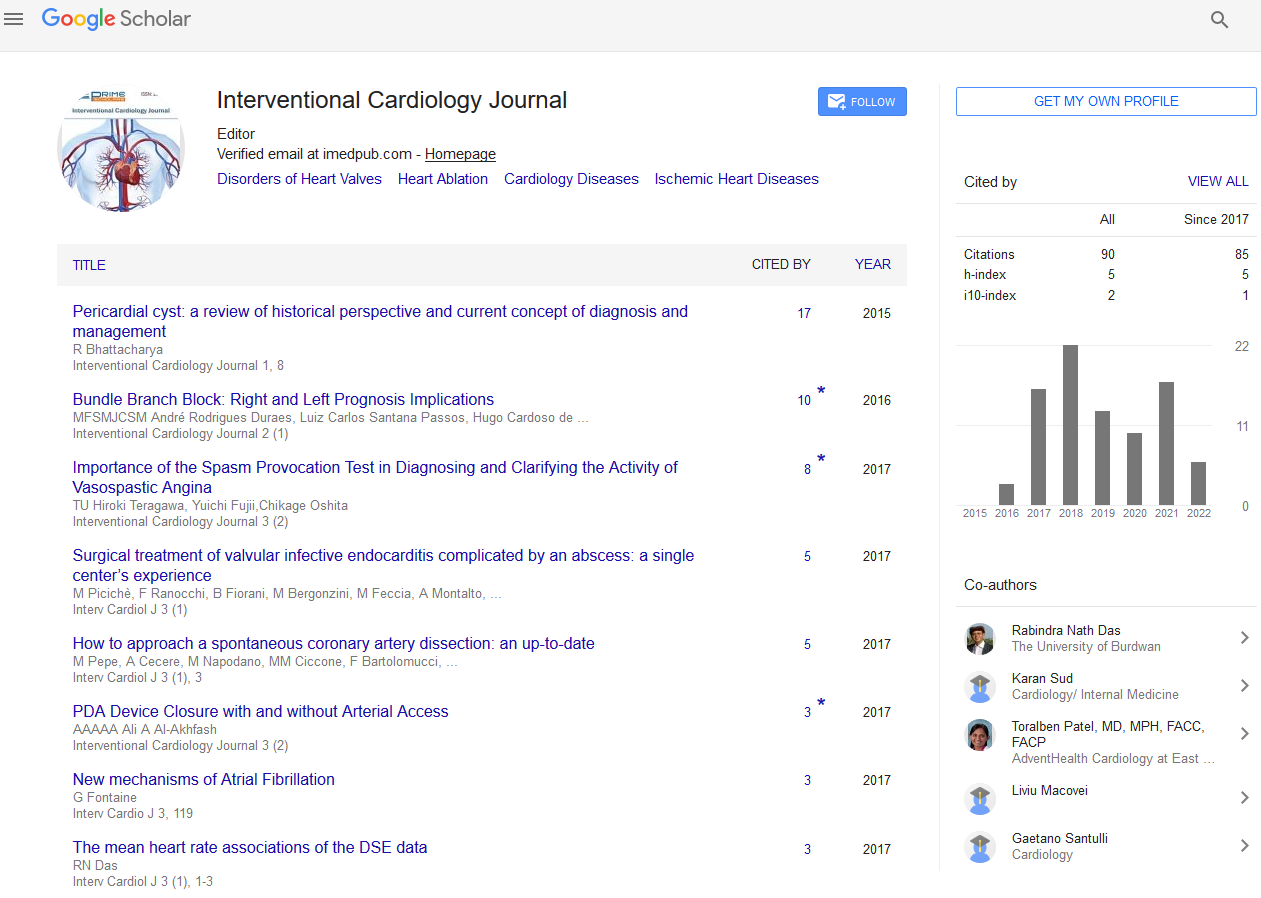Opinion - (2023) Volume 9, Issue 11
Comprehensive Management of Cardiogenic Shock: A Critical Endeavor
Dennis Mark*
Cardiology Department, Kangan University, Australia
*Correspondence:
Dennis Mark,
Cardiology Department, Kangan University,
Australia,
Email:
Received: 30-Oct-2023, Manuscript No. IPIC-23-18484;
Editor assigned: 01-Nov-2023, Pre QC No. IPIC-23-18484 (PQ);
Reviewed: 15-Nov-2023, QC No. IPIC-23-18484;
Revised: 20-Nov-2023, Manuscript No. IPIC-23-18484 (R);
Published:
27-Nov-2023, DOI: 10.21767/2471-8157.9.11.108
Introduction
Cardiogenic shock represents a life-threatening state wherein
the heart's ability to pump blood is severely compromised,
resulting in inadequate perfusion of vital organs. This critical
condition often arises from various cardiac issues such as acute
myocardial infarction (heart attack), severe heart failure, myocarditis,
or complications during cardiac procedures. The clinical
presentation of cardiogenic shock includes symptoms of
profound hypotension, decreased urine output, altered mental
status, cold extremities, and signs of organ hypo-perfusion
such as elevated lactate levels or metabolic acidosis. Diagnosis
involves a comprehensive assessment, including physical
examination, hemodynamic monitoring, electrocardiography,
echocardiography, and blood tests to evaluate cardiac enzymes
and biomarkers. Immediate stabilization of patients in cardiogenic
shock is paramount. Initial management includes ensuring
adequate oxygenation, establishing intravenous access,
administering fluids cautiously to optimize volume status, and
initiating vasopressors or inotropes to support blood pressure
and cardiac output. In cases where acute myocardial infarction
is the underlying cause, rapid revascularization is crucial. This
may involve Percutaneous Coronary Intervention (PCI) to open
blocked coronary arteries or, in certain situations, Coronary Artery
Bypass Grafting (CABG). Early restoration of blood flow to
the affected myocardium can significantly improve outcomes in
cardiogenic shock secondary to a heart attack.
Description
Inotropic agents such as dobutamine, milrinone, or dopamine
are often employed to augment myocardial contractility and
improve cardiac output. Careful titration of these medications
is essential to avoid exacerbating myocardial oxygen demand
or causing arrhythmias. For patients refractory to medical
therapy, mechanical circulatory support devices like Intra-Aortic
Balloon Pumps (IABP), percutaneous ventricular assist devices
(Impella), or Extracorporeal Membrane Oxygenation
(ECMO) may be utilized to provide temporary cardiac support
and maintain organ perfusion while the underlying cause is
addressed. Achieving a delicate balance in fluid management
is crucial in cardiogenic shock. While ensuring adequate perfusion,
excessive fluid administration can worsen pulmonary
congestion and compromise cardiac function. Diuretic therapy
may be necessary to alleviate fluid overload in cases of
acute decompensated heart failure. Continuous hemodynamic
monitoring through invasive measures like pulmonary artery
catheterization or non-invasive methods such as bedside echocardiography
aids in assessing cardiac function, guiding therapeutic
interventions, and evaluating response to treatment. A
multidisciplinary approach involving cardiologists, intensivists,
cardiac surgeons, nurses, and other healthcare professionals is
essential in managing cardiogenic shock. Close collaboration
allows for timely decision-making, effective coordination of
care, and optimizing treatment strategies based on individual
patient needs. Patients in cardiogenic shock are at risk of developing
various complications, including renal failure, liver dysfunction,
coagulopathy, and Systemic Inflammatory Response
Syndrome (SIRS). Vigilant monitoring, appropriate organ support,
and meticulous care are pivotal in preventing and managing
these complications.
Conclusion
In conclusion, managing cardiogenic shock demands a multidisciplinary
and comprehensive approach aimed at promptly
stabilizing the patient, addressing the underlying cause, optimizing
cardiac function, and preventing complications. Early
recognition, timely interventions, and ongoing research endeavors
hold the promise of improving outcomes for patients
facing this critical cardiovascular emergency. In the challenging
landscape of cardiogenic shock, the integration of advanced
therapeutic strategies, meticulous supportive care, and collaborative
efforts among healthcare professionals stands as the
cornerstone in striving to improve patient survival and longterm
outcomes.
Citation: Mark D (2023) Comprehensive Management of Cardiogenic Shock: A Critical Endeavor. Interv Cardiol J. 9:108.
Copyright: © 2023 Mark D. This is an open-access article distributed under the terms of the Creative Commons Attribution License, which permits unrestricted use, distribution, and reproduction in any medium, provided the original author and source are credited.

